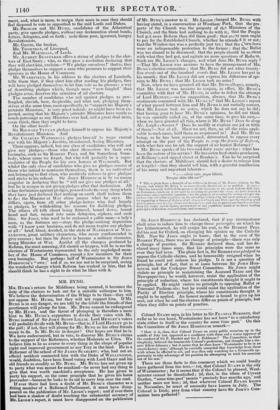MR. BYNG.
MR; HUME'S return for Middlesex being secured, it becomes the duty of the electors to look out for a suitable colleague to him. We believe the determination of the Whigs to be thus—they will not- oppose Mr. HUME, but they will not support him. If Mr. BYNG is in any danger, we are told by the Globe the friends of that gentleman will plump for him. Mr. BYNG cannot be endangered by Mr. HUME, and the threat of plumping is therefore a mere hint to Mr. HUME 'S supporters to divide their votes with Mr. BYNG instead of Sir JOHN SCOTT LILLIE. Lord HENLEY'S voters will probably divide with Mr. BYNG—that is, if Lord HENLEY go to the poll; if not, they will plump for Mr. BYNG as his other friends mean to do. Is Mr. BYNG in danger? Our hopes are that he is. We have endeavoured, but in vain, to discover Mr. BYNG'S claims to the support of the Reformers, whether Moderate or Ultra. We believe him to be as averse to every thing in the shape of popular right and improved government as any Tory in the land. He is a Reformer of the school of Sir JAMES SCARLETT; who, had not an official accident connected him with the Duke of WELLINGTON, would, doubtless, have been found votinc, with Lord GREY and his old friends as steadily as Mr. BYNG. Mr. BYNG has not given up to party what was meant for mankind—he never had any thing to give that was worth mankind's acceptance. He has given to party his support, on the same principle that he gives his horse provender—because he looks to its aid to carry him over the road. If ever there had been a doubt of Mr. BYNG'S character as a fitting member of a Reformed Parliament, it must have disap- peared on the publication of Mr. LEIGH'S report ; and if ever there had been a shadow of doubt touching the substantial accuracy of Mr.LEIGH'S report, it must have disappeared on the publication of Mr. BYNG'S answer to it.' Mr.LEina -charged Mr. BYNG with having stated, in a conversation at Wrothanz Park, that the pro . perty of the Church was the property of thse Ministers of the Church, and the State had nothing to do with it; that the People had got more Reform than did them good ; that evory man ought laalwl st to pay for the Established Church, whether he attended it or not; that the WindoW-tax was a perfectly just tax; that the C or were an indispensable protection to the farmer ; that 60. was too absurd to be discussed; that the people should be co.ntent with what they had got, and agitate no more questions of Refirem. Such are Mr. LEIGH'S charges, and what does Mr. BYNG reply ? —That Mr. LEIGH was anxious to have the management of Mr. BYNG'S election committee ; that Mr. BYNG did not utter twenty- five words out of the hundred words that Mr. LEIGH has put in his mouth ; that Mr. LEIGH did not express his difference of opi- nion to Mr. BYNG ; that Mr. LEIGH took no notes !
Now, when we have granted all that Mr. BYNG alleges, namely-, that Mr. LEIGH was anxious to conjoin, in effect, Mr. BYNG'S committee with that of Mr. HumE, in order to defeat the attempt of Lord HENLEY,—on the supposition, always, that Mr. BYNG S sentiments concurred with Mr. HUME'S;* that Mr. LEIGH'S report of what passed between him and Mr. BYNG is not verbally correct, that Mr. LEIGH took no notes, which he does not say he did; that having gone to hear Mr. BYNG'S opinions, he did not think he was specially called on, at the same time, to give his own,— when we have granted all this, where is Mr. BYNG? Does he deny Mr. Leigh's charges? .Does lie modify or explain one jot or tittle of them?—Not at all. Must we not, then, on all the rules appli- cable to such cases, held them as acquiesced-in? And Mr. BYNG being, as he has been represented, determined to oppose every attempt on the part of the People to reap the fruits of &form, with what face can he ask the support of an honest Refbrmer?
Mr. BYNG speaks of his two-and-forty years' service : what has been the nature of his service ? He has eaten beef-steaks perchance, at Bellamy's, and sipped claret at Brookes's. Can he be surprised that the electors of Middlesex should feel a desire to release him at length ?—that they. should tell him, with a grateful recollection of his many and important labours- "— edisti satis, atque bibisti,
Tempos abiretibi est ?" .
* This is plain from a draught of an :tddress in favour of Mr.12v:vu, written by Mr. LEIGIT, and which Mr. BYNG is SO IllarVenolAy 111-adVi,011 as to pnbli,lt. It Says- " Having latrre‘sly watched the progress ef t ho measure in' the great iierlbrm Bill, and, as Reforiners, taken an aeare part in assisting In pntrtire the slaw, We haw thrilled a ntunerens and respeetalde eonnnittoe for the pulp", ,,Itrimr Is rt•tirti tof repreSCIF.
tatiVeS Ulm will zratu,Sly.fidishp ep the firleftnla.li• bll Melt nati,;111 IhrOSUre.
ly surpurliny a Ilioron b!,:hrot C!,,redt ant SI,?e, and lie fdmiilion ali uselesS places, ie',,ionq, noel fineitledie, ; and also iu phili2el. ullr brotben electors from the crafty and designing pretension; td any candidate to these leading
principles of freedom, retrenchment, and economy."



























 Previous page
Previous page